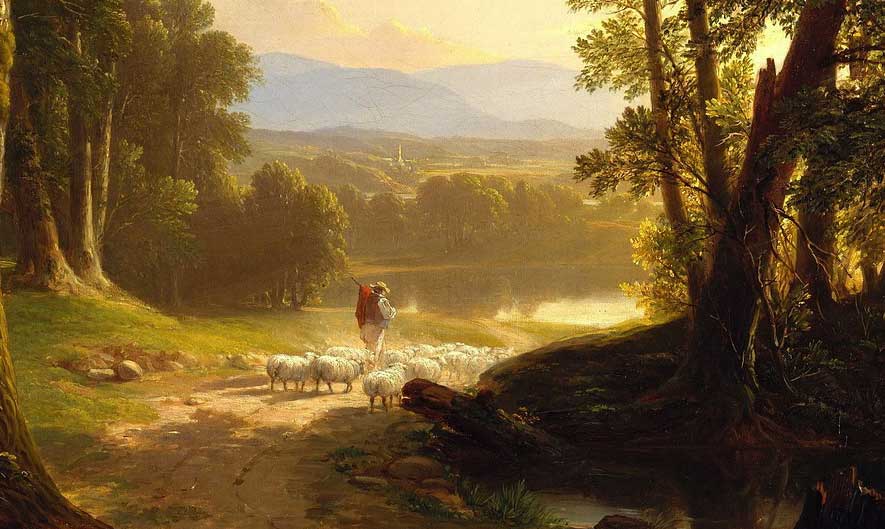Podcast: Play in new window | Download | Embed
Subscribe: Apple Podcasts | Google Podcasts | Spotify | Amazon Music | Android | iHeartRadio | Podchaser | Email | Deezer | RSS | More
The 23rd Psalm is familiar to many. It is a reminder of God’s faithfulness and evokes beautiful mental imagery. We can imagine beautiful hillsides, lush pastures, and the peaceful streams. Even in our Biblically illiterate culture, if people know any passage of Scripture, it is likely to be this one.
It is encouragement in times of trouble, but more than that, it is a declaration of victory.
We have been studying Psalms 23 for the past eight weeks in our third grade Sunday school class, going through it verse by verse. It talks about God’s love and care for us, who He is and the roles He takes in our lives. He is our Shepherd, our Provider, Our Protector, and our Guide. If you’ve read the Psalm once, I’m not telling you anything you don’t already know.
But more than that, this Psalm is a battle cry. It is a song of warfare. It is a song of faith where David “calls the things that are not, as though they were.” (Romans 4:17)
David’s Back Story
To understand the full import of the Psalm, we have to look at David’s back story.
He grew up in Bethlehem during the reign of King Saul, the first king of Israel. He was the youngest of eight brothers, and while they were off taking care of other responsibilities for the family, he had the lowly job of shepherd of his father’s flocks (the same job Rebekah was performing when Abraham’s servant happened across her. Genesis 24 )
Saul had been skating back and forth across the line of God’s commands (1 Samuel 13:7-14,) and finally he went too far. He was to completely destroy the Amalekites, but instead, he kept the plunder for himself (1 Samuel 15).[1] Because of that willful action, the kingship of Israel was removed from his family.
God sent Samuel the town of Bethlehem[2] and invited Jesse, David’s father, to come as Samuel made a sacrifice. As each son came out before he, Samuel thought, “He must be the one,” but each time God said no. Like the Prince searching for Cinderella, Samuel asked, “Is there anyone else?” and so David was sent for. He didn’t even rank high enough in his family’s mind that they didn’t include him until asked. ( Samuel 16:1-13 )
When David came before Samuel, God told him, “He is the one”
However, unlike Cinderella who left her pots and pans and rode off with her prince into the sunset, David went back to his sheep. And there he stayed, we don’t know exactly how long, but time passed until there was trouble at the border with the Philistines. When David was sent to take supplies to his brothers at the front, he heard the Philistines, led by Goliath, mocking the Israelites. (1 Samuel 17:22-23)
This infuriated David and he asked, “Who is this pagan Philistine anyway, that he is allowed to defy the armies of the living God?” (1 Samuel 17:26) His brothers, both dismissive and indignant, asked him who he thought he was and what he could possibly do about it. (1 Samuel 17:28)
Goliath had challenged Saul’s army to a one on one combat. He would face their champion and the winner would decide the war. David volunteered to be this champion, and when again mocked by his brothers, he insisted.
You see, Goliath was not the first big and scary thing that David had faced. While he was out alone in the fields with his sheep, other predators had come against him. He said, “God was with me when I killed a bear and a lion, he will be with me here.” (1 Samuel 17:34-36)
These little things, facing wild animals to protect dumb ones, were preparation, a building of faith . . . the making of a hero . . . for when he faced a giant and where the outcome determined the course of a nation. No pressure.
You know the story. He declined the weapons of war that Saul wanted to give him and instead, stuck with his slingshot and five smooth stones. With that, he felled the giant. (1 Samuel 17:40-50)
The army and the people were ecstatic. David was the man of the hour. And Saul, recognizing this popularity, kept him close. (1 Samuel 18:2)
The Turning of the Tale
So here is David, a humble shepherd, who kills the giant, saves the city, is sponsored by the king, befriended by the prince, and marries the princess. It sounds like a happily ever after. What could go wrong?
Pride and Jealousy
Saul became jealous of David and plotted to kill him. (1 Samuel 18:8-29) David escaped in the night. For years, David was on the run[3] from Saul with a small band of outlaws and misfits. (1 Samuel 22:2) These men that no one wanted became David’s “Mighty Men.” They had to hide in caves, in enemy territory, and were betrayed more than once by those they thought were friends. ( 1 Samuel 22-26 )
They were often hungry, cold, and thirsty and had to constantly be on the watch for Saul’s men.
A Song of Mighty Praise
While this was going on, David wrote Psalm 23.
Rather than abstract thoughts about a distant God and platitudes of faith, he gave it form in the thing that was the most familiar in his life . . . Shepherding.
David knew how he cared for his own sheep, and he used that imagery to proclaim that God is good and He would deliver him. Jesus, a descendant of David, referred to this same analogy saying, “I am the Great Shepherd.” ( John 10:11 )
David didn’t just mope around like a martyr saying, “If it’s God’s will,” or an ambiguous statement like “God will work it out.”
David make specific pronouncements and sang them as a praise to God.
Even though he was hungry and thirsty, he said, “The Lord is my Shepherd, I shall not want.”
He was lived under constant threat, but he said, “He makes me lie down in green pastures, he leads me beside quiet waters.”
He had cause for continual anxiety, instead he proclaims, “He restores my soul.”
His followers were pressuring David to take matters into his own hands and claim the kingship in his own timing, but David said, “He leads me in paths of righteousness for His name’s sake.”
Saul came to the cave David and his men were hiding. (1 Samuel 24:1-13) Death was just a breath away, David wrote, “Even though I walk through the valley of the shadow of death, I fear no evil, for You are with me. Your rod and your staff, they comfort me.”
David was public enemy #1 when Saul was King, but he believed what God had told him and wrote, “You prepare a table before me in the presence of my enemies. You anointed my head with oil; My cup overflows. Surely goodness and mercy will follow me all the days of my life, and I will dwell in the house of the Lord forever.”
He believed God, and so he spoke (Psalm 116:10) He praised God for fulfilling His promises to David . . . Before those promises were fulfilled.
Endnotes
[1] Saul justified his actions by saying that his plan was to use the plunder to make a sacrifice to the Lord. This was Samuel’s response (vs 22-23)
“What is more pleasing to the Lord: your burnt offerings and sacrifices or your obedience to his voice? Listen! Obedience is better than sacrifice, and submission is better than offering the fat of rams. Rebellion is as sinful as witchcraft, and stubbornness as bad as worshiping idols.”
[2] Reading this, I noticed for the first time that in verse 4, it states that when Samuel arrived at Bethlehem, “the lders of the town came trembling to meet him. “What’s wrong?” they asked, “Do you come in peace?” The assumption was that if a prophet of the Lord came to their town that they must have committed an offense that needed to be reckoned. I think we often have a sort of cavalier attitude towards God and his communications. We see the Jesus, our mediator, and ignore the entirety of God’s character which is righteousness and justice. Jesus can plead our case when we confess our sins, otherwise, as the writer of Hebrew said, “it is a terrible thing to fall into the hands of a living God.” (Hebrews 10:31)
[3] We don’t know how long it was from the time David was anointed by Samuel to the time he was crowned king of Israel. He was 30 years old when he was crowned king (2 Samuel 5), for seven and a half years before that he reigned over Judah only from Hebron (2 Samuel 3:1) It seems from the passage a period of time passed from his anointing to joining Saul’s household. Because of the word used to describe David at his anointing, scholars believe he was between 10 and 15 years old.
1 Samuel 13:1 Saul was 30 years old when he became king, and he reigned for forty-two years.
After Saul’s death, Ishbosheth was 40 and ruled for 2 years while David ruled over Juday for 7.5 years (2 Samuel 2:10-11)
God had promised David the kingdom, but David still had a “long war” before he defeated Ishbosheth and the rest of Saul’s Dynasty (2 Samulel 3:1)
During David’s 7 year reign in Hebron, his sons were born: Amnon (Ahinoam), Daniel (Abigail), Absalom (Maacah), Adonijah (Haggith), Shephatiah (Abital), Ithream (Eglah)





Thank you for this. I’m still fairly new and although I’ve read David’s story and Psalm 23 I have never thought of it in this way before. This was helpful.
Thank you for your comment. I’m so glad it was helpful.
I’m not “new,” I’ve read that Psalm many times, and I even go through the Psalms every year in a 50 day study, and I never saw it until reading through it eight weeks in a row for our third grade Sunday School class.
I had also just read Strengthen Yourself in the Lord by Bill Johnson and Optimistic Trust by Jim Croft, which are both about praising your way through trials. I’m not sure if I would have seen it otherwise.
Hi Carla,
Noticed an error in the retelling.
Abraham’s servant found Rebekah, not Rachel.
Thanks for the catch Lili!